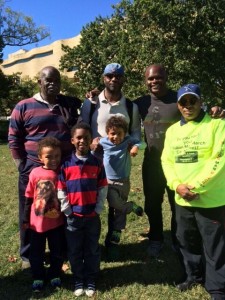
By Michael H. Cottman,
Urban News Service
Washington-Bill Murrain, a lawyer from Conyers, Georgia, traveled to the National Mall for the 20th anniversary of the Million Man March and stood side-by-side with three generations of black males: his sons, son-in-laws, and five grandsons.
And last weekend, as Murrain walked near the White House, he spoke with pride about the accomplishments of black Americans over the years, which includes the historic election of President Barack Obama, the nation’s first African-American president.
“The fact is, for all of its imperfections, we live in the most magnanimous country in the world,” said Murrain, who voted for Obama in both presidential elections. “I am reassured that the next generation of black males has a brighter future ahead of them.”
“They awaken to a First Family and a nation lead marvelously by one of their race, President Obama, and my grandsons take it as a normal occurrence,” Murrain said. “It is their reality.”
Murrain joined thousands of Africa-American men and women who assembled on the National Mall for the 20th anniversary of the Million Man March, which boasted a modern-day theme that resonated with many African-Americans and other people of color: “Justice or Else.”
As a civil rights attorney in the 1960s who rallied for social justice, Murrain said he was reminded of his racial confrontations with police in places like the Mississippi Delta, Stockton, California and Benton Harbor, Michigan.
Racial profiling and the number of young black men who have been wounded or killed by police is a crisis, Murrain said, twenty years after the Million Man March.
“It pains me greatly that in these days, in these times, we must still respond to the cry that “BLACK LIVES MATTER,” Murrain said. “Our quest and our charge, having been here today, is to recognize that it is our responsibility to strive to assure that our good days must increasingly outnumber our bad days.”
But some key observers and civil-rights activists assert that, since the original Million Man March, life for many young black men has grown progressively worse.
More black men are being incarcerated at higher rates and young African-American men are falling behind their peers in the classroom, according to a PBS report on the dropout rate. Only 54% of African-Americans graduate from high school, compared to more than 75% of their Caucasian and Asian-American peers.
African-American males are filling up prisons nationwide in disproportionate numbers, the NAACP estimates, comprising 1 million out of a total of 2.3 million incarcerated men.
In fact, if current trends continue, according to the NAACP, “one in three black males born today can expect to spend time in prison during his lifetime.” Also, 49% of African-American males have been arrested before age 23, and one in three African-American men age 18-24 is unemployed.
Meanwhile, Saturday’s rally differed from the first march. From the stage, speakers from multiple ethnic backgrounds took to the microphone, including Native Americans, Latinos, Haitians, and Palestinians, who spoke of racial injustice among all people of color.
Dwayne Morgan, 36, drove nine hours from Indianapolis to Washington, D.C., with his nephew and four cousins.
“I wanted them to witness this event, and I wanted them to learn about what’s happening around them,” Morgan said, as he stood on the Mall. “And I wanted them to learn something about themselves.”
“I came because my parents want me to learn about our history,” said Laurence Shelton, 14, who came to the Million Man March from Gary, Indiana.
And Lewis Allen, 14, from Indianapolis, said his family expects a positive change from his experience at the Million Man March, adding that he has a responsibility as a black teenager to learn more about African American history.
“They want me to leave Indianapolis as a boy,” Allen said, “and come back as a man.”
Thousands of young black males like Allen could experience racial profiling in their lifetime. In fact, California police now must report racial characteristics of any person they stop, under a new law intended to respond to public controversy over the high-profile, police-related deaths of unarmed black men including Michael Brown in Ferguson, Missouri, Freddie Gray in Baltimore, and Eric Garner in New York City.
“I came because I wanted to be a part of something positive,” said Tinzelow Baldwin, 40, who traveled from Charlotte, North Carolina. “I’m tired of seeing so many young black men being shot by police. I’m just tired of it.”





So; I hope the million folk who were there go back home and do something. It’s one thing to make a trip and listen to mezmerizing and captivating speakers from all across the country. But it’s something else (again) to go back home and take some action…CHANGE the words to deeds…